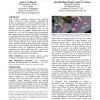Free Online Productivity Tools
i2Speak
i2Symbol
i2OCR
iTex2Img
iWeb2Print
iWeb2Shot
i2Type
iPdf2Split
iPdf2Merge
i2Bopomofo
i2Arabic
i2Style
i2Image
i2PDF
iLatex2Rtf
Sci2ools
82
Voted
CHI
2009
ACM
2009
ACM
User-defined gestures for surface computing
Many surface computing prototypes have employed gestures created by system designers. Although such gestures are appropriate for early investigations, they are not necessarily reflective of user behavior. We present an approach to designing tabletop gestures that relies on eliciting gestures from non-technical users by first portraying the effect of a gesture, and then asking users to perform its cause. In all, 1080 gestures from 20 participants were logged, analyzed, and paired with think-aloud data for 27 commands performed with 1 and 2 hands. Our findings indicate that users rarely care about the number of fingers they employ, that one hand is preferred to two, that desktop idioms strongly influence users' mental models, and that some commands elicit little gestural agreement, suggesting the need for on-screen widgets. We also present a complete user-defined gesture set, quantitative agreement scores, implications for surface technology, and a taxonomy of surface gestures. Our...
CHI 2009 | Complete User-defined Gesture | Human Computer Interaction | Surface Gestures | Tabletop Gestures |
Related Content
| Added | 24 Nov 2009 |
| Updated | 24 Nov 2009 |
| Type | Conference |
| Year | 2009 |
| Where | CHI |
| Authors | Jacob O. Wobbrock, Meredith Ringel Morris, Andrew D. Wilson |
Comments (0)

